The artistic adaptation of the stories of February-March 2022 from Russian-occupied Buchi and the surrounding villages has already experienced several waves of criticism. And this is long before the premiere.
The film "Buch" is criticized for being released "too soon" - when not all the dead Bucha residents have been identified, and the trauma of those who survived is too fresh.
They criticize that this is a feature film, not a documentary film - with all the inaccuracies and conventions of a game movie.
Finally, a flurry of indignation was caused by one of the English-language posters with the inscription Bucha and a bombed-out high-rise building in... Borodyanka.
As a resident of Buchi and a journalist who worked on Russian war crimes here, I looked at Buchi's working materials to see if the film really deserves criticism.
Let's try to figure it out without spoilers.
History
The film is based on the real story of Konstantin Gudauskas, a volunteer who took dozens of people out of Vorzel, Buchi and other locations occupied by the Russians.
Konstantin's father is Lithuanian, but he himself was born in Kazakhstan. It was the Kazakh passport, which was "union" for Russians, that helped him pass the checkpoints of the Russian army.
In an interview with the Irpin YouTube channel "Unbelievable UA", he describes how he took the injured child out and prayed that she would not die in his car.
"Were the Russians beautiful? You know, it wasn't. It wasn't," Kostyantyn says in broken Ukrainian with tears in his eyes, and it's really a very emotional story for a film adaptation.
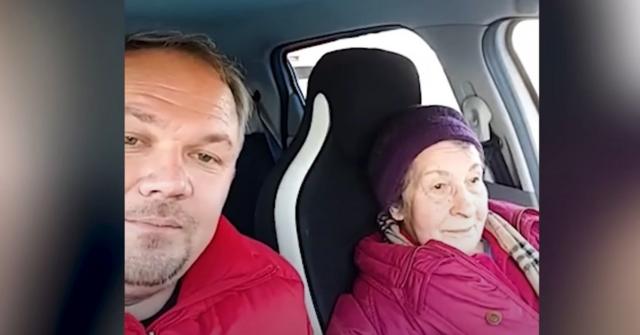
PHOTO AUTHOR, “INCREASING_UA / KOSTYANTYN GUDAUSKAS
In addition to the stories of Gudauskas, the creators of the film also consulted with the GUR of the Ministry of Defense of Ukraine, and to prescribe the dialogues of the Russian military, they listened to publicly released recordings of their negotiations. Russian vehicles in the film are trophy armored personnel carriers and trucks captured by Ukrainian fighters.
That is why most of the stories described in "Buch" are related to the reality of the occupied Kyiv region in one way or another.
For example, the episode from the teaser, where a Russian soldier shoots captured men and says to civilians "This is mud", despite all the seemingly cinematic, is real.
In the BBC documentary about the eight Teroboronov soldiers who were shot on Yablunska Street, one of the women recalled how she saw the prisoners still alive and one of the Russian commanders told them not to look at them, because they were "not people, but dirt, animals."
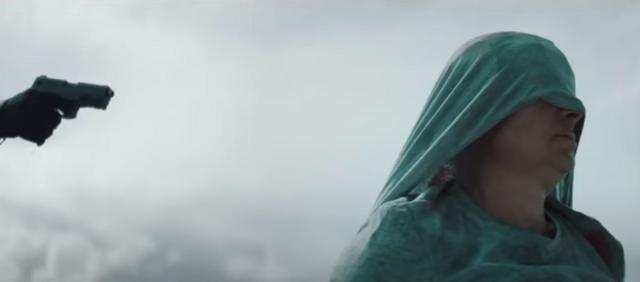
PHOTO AUTHOR, BUCHA.FILM
Another eyewitness recalled how one of the captured boys was shot in the head and a T-shirt was pulled over his head so that he could not see anything. And then there was a large pool of blood in that place - "a thick layer, about two by three meters."
The authors of the film try to convey all this in the tape - however, without excessive bloodiness and detailing of deaths. That is, they try to be attentive to details even in artistic interpretation.
However, there is one discrepancy between the details that cannot be ignored.
Poster and Borodyanka
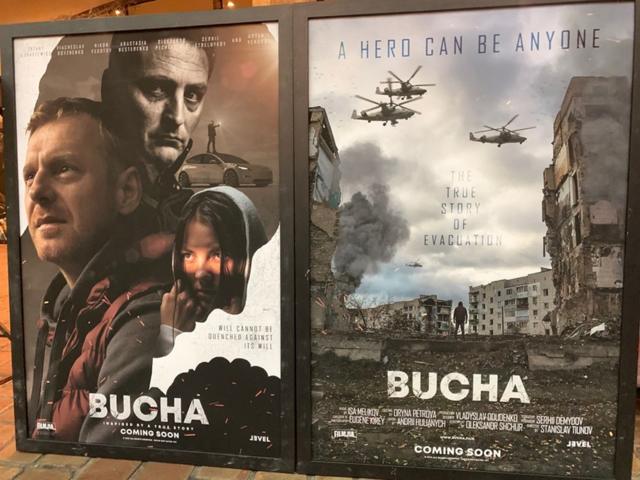
It is about the "Buchi" poster, on which Borodyanka is depicted.
The screenwriter and producer of the film, Oleksandr Shchur, explains that this is "a poster project for the English-speaking audience, which foreign experts helped make."
And the name Bucha does not automatically mean that it features Bucha. After all, the action of the film also takes place in Borodyanka, which is also located in the Buchansk district - "Velikyi Bucha". Although this is a rather artificial term for the locals.
In the end, he says, one must understand the conventions of feature films - the Dunkirk posters are also not a photo from the actual place of evacuation of the British at the beginning of World War II.
"At the time of filming, there were no destroyed buildings left in Buchi that would match the atmosphere. I hope it will soon be the same with all our cities," adds the screenwriter.
However, despite all these arguments, the poster caused a lot of criticism in social networks, and above all - from the residents of Buchi and Borodyanka.
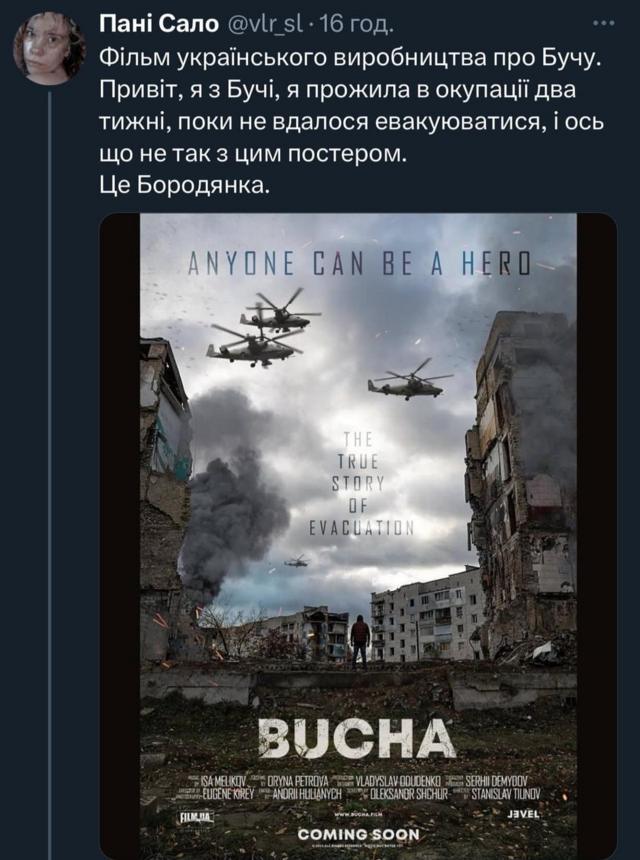
PHOTO AUTHOR, X (TWITTER)
"Our Borodyanka has its own tragedy, and with the image of a destroyed house and the inscription "Bucha" you humiliate people's memory! You don't need to come up with an excuse ("Big Butch" is nonsense at all), just change the poster and that's it! This is not hate, but a demand of the residents of Borodyanka!" - wrote one of the commentators.
In the depicted house, which was destroyed by Russian aerial bombs in early March 2022, real people died. It is quite natural that their relatives and the residents of Borodyanka in general are outraged that this episode was used for advertising (one way or another, the poster of the film is still an advertisement) of a film in the title of which is another city.
Borodyanka, Bucha, Irpin, Moschun, Zdvizhivka, and Izyum, far from Kyiv region, and dozens of other towns and villages, experienced tragedies caused by one perpetrator - the Russian army.
But can these tragedies be mixed up or swapped around to appeal to a wider Western audience?
For the residents of Borodyanka, this may look like a devaluation of their tragedy. It also "triggers" Buchanans.
Finally, there is one more point.
The poster was immediately picked up by Russian Telegram channels, which consistently prove that "Bucha" is a fake.
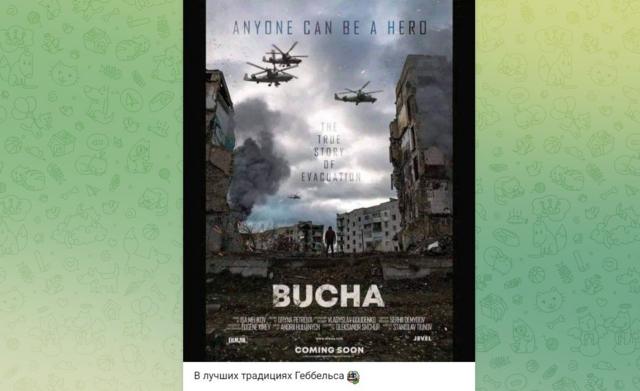
AUTHOR OF PHOTO, TELEGRAM
This has already given some commentators a reason to compare "Bucha" with the Russian "Witness", which is completely detached from any facts - a failed Russian film, shot with state money, about the fact that "everyone was killed in Bucha by Ukrainian nationalists" (IMDB rating: 1, 2 out of 10).
Oleksandr Shchur replied to this remark that there is no point in worrying about what Russian propaganda broadcasts for a long time.
But the thesis that "a different city is depicted on the poster of the film about Bucha" can probably also have an effect on the Western audience.
As a result of the discussions, the creators of the film decided to make a special screening for the residents of Borodyanka.
Filming with military equipment and actors in Russian uniforms was not carried out in Buch and Borodyanka, so as not to traumatize local residents with memories of the occupation.
The charisma of an anti-hero
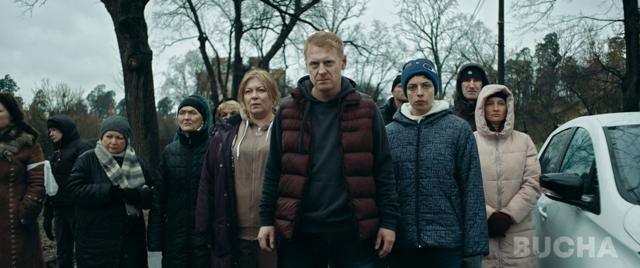
PHOTO AUTHOR, BUCHA.FILM
Director Stanislav Tiunov said that Caesar made a lot of efforts to get used to the rather specific role of a Kazakh Ukrainian in the conditions of February 24, 2022. He talked to consultants and asked the crew about those days.
A complete resemblance to Konstantin Gudauskas did not work out, but such a goal was not set.
However, the doubts, fear and motivation of the protagonist, for whom the war in Ukraine, in general, could well remain "alien", are visible.
And the main anti-hero - FSB colonel - was played by Vyacheslav Dovzhenko.
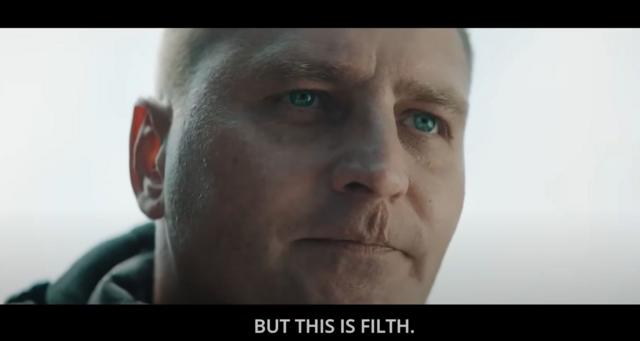
PHOTO AUTHOR, BUCHA.FILM
In his performance, the Russian turned out to be very charismatic. This was especially evident in dialogues with other anti-heroes – FSB officers and Chechens.
"My main task in this role was to show humanity, let's say, how terrible the ideology of fascism is and what it can do to such a being as a person. That is, what does the ideology of a character who suffers from it turn into," said the actor in one of the recent interviews.
And in response to criticism that "Bucha" was filmed too soon, he remembered that the same was said about "Cyborgs".
"My point of view is that it should be done. We should not do this for us, those who are directly experiencing these times, because it is very painful. But we have to do it, first of all, for the next generation, which will study it as a historical fact", says Vyacheslav Dovzhenko.
"And secondly, for the European viewer, who is still under liberal illusions about Russia. They are still thinking, who is to blame, maybe they (Ukrainians. - Ed. ) are shooting at themselves," he adds.
In general, "Bucha" was not without dramatic exaggerations and a certain demonization of the Russian military.
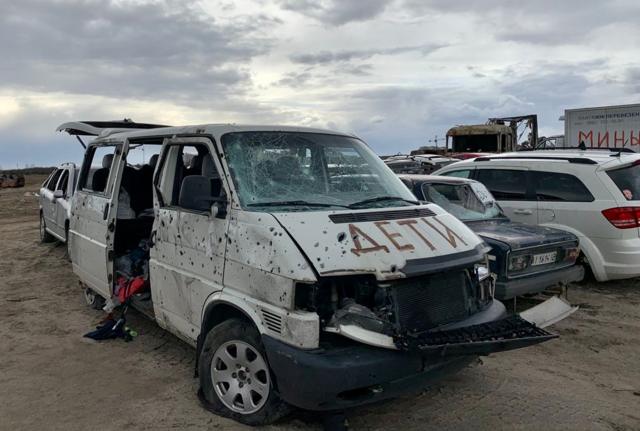
But taking into account the reality of at least part of the described stories, it is hardly appropriate to consider the film as outright propaganda.
Read about what happened in the city during the occupation in the article about local chats that recorded the shootings of civilians.
When is the premiere?
The filming of "Buchi" was financed with private funds, for example, from the American investor Semyon Dukach, who created the Cash for Refugees support fund for Ukrainian refugees. Dukach himself was born in Russia, and in 1979 he emigrated to the USA, where he now invests in startups.
In addition to the feature version, the film crew is also working on a documentary film with the stories of witnesses of the occupation. As Oleksandr Shchur says, they recorded too many such stories to leave them without an audience.
The premiere of "Buchi" in Ukraine will take place in September 2024, the distribution will be made by Film.UA Group.
Until then, the makers of the film plan to promote it through streaming platforms or a major international distributor to reach a larger audience.
There will also be screenings in various formats abroad, the working materials of the film have already been shown in the USA and Great Britain.
On February 24, these materials can be seen in Los Angeles.
And although the film was made in particular with a Western audience in mind, its main viewers will certainly be in Buch, Vorzel, Gostomel, Irpen, Borodyanka, Klavdiyev, Nemishaev, Rubezhivka, Yasnohorodka, Makarov, Ivankov, Dymer and dozens of other villages of Kyiv region and throughout of Ukraine.

